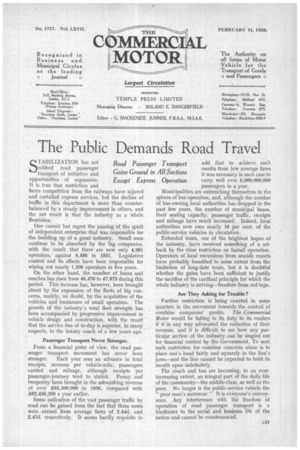The Public Demands Road Travel
Page 67

If you've noticed an error in this article please click here to report it so we can fix it.
STABILIZATION has not robbed road passenger transport of initiative and opportunities of expansion. It is true that restriction and fierce competition from the railways have injured and curtailed express services, but the decline of traffic in this department is more than counterbalanced by a steady improvement in others, and the net result is that the industry as a whole flourishes.
One cannot but regret the passing of the spirit of independent enterprise that was responsible for the building up of a great industry. Small men continue to be absorbed by the big companies, with the result that there are now only 4,991 operators, against 6,486 in 1931. Legislative control and its effects have been responsible for wiping out nearly 1,500 operators in five years.
On the other hand, the numberof buses and coaches has risen from 46,476 to 47,973 during this period. This increase has, however, been brought about by the expansion of the fleets of big concerns, mainly, no doubt, by the acquisition of the vehicles and businesses of small operators. The growth of the industry's total fleet strength has been accompanied by progressive improvement in vehicle design and construction, with the result that the service bus of to-day is superior, in many respects, to the luxury coach of a few years ago.
Passenger Transport Never Stronger.
From a financial point of view, the road passenger transport movement has never been stronger. Each year sees an advance in total receipts, revenue per vehicle-mile, passengers carried and mileage, although receipts per passenger-journey tend to shrink. Penny and twopenny fares brought in the astonishing revenue of over £65,500,000 in 1936, compared with £62,456,208 a year earlier.
Some indication of the vast passenger traffic by road can be gained from the fact that these sums were earned from average fares of 2.44d. and 2.47d. respectively. It seems hardly requisite to add that to achieve such results from low average fares it was necessary in each case to carry well over 6,000,000,000 passengers in a year.
Municipalities are entrenching themselves in the sphere of bus operation, and, although the number of bus-owning local authorities has dropped in the past few years, the number of municipal buses, their seating capacity, passenger traffic, receipts and mileage have much increased. Indeed, local authorities now own nearly 16 per cent. of the public-service vehicles in circulation.
Extended tours, one of the brightest hopes of the industry, have received something of a setback by the close restriction on fantail operation. Operators of local excursions from seaside resorts have probably benefited to some extent from the limitation of long-date tours, but it is doubtful whether the gains have been sufficient to justify the sacrifice of the cardinal principle for which the whole industry is striving—freedom from red tape.
Are They Asking for Trouble ?
Further restriction is being courted in some quarters in the movement towards the control of combine companies' profits. The Commercial Motor would be failing in its duty to its readers if it in any way advocated the reduction of their revenue, and it is difficult to see how any particular section of the industry can be singled out for financial control by the Government. To seek such restriction for combine concerns alone is to place one's head fairly and squarely in the lion's jaws—and the lion cannot be expected to hold its mouth open indefinitely.
The coach and bus are becoming, to an everincreasing extent, an integral part of the daily life of the community—the middle-class, as well as the poor. No longer is the public-service vehicle the poor man's motorcar." It is everyone's conveyance. Any interference with the freedom of operation of road passenger transport is a hindrance to the social and business life of the nation and cannot be countenanced.




























































































































































